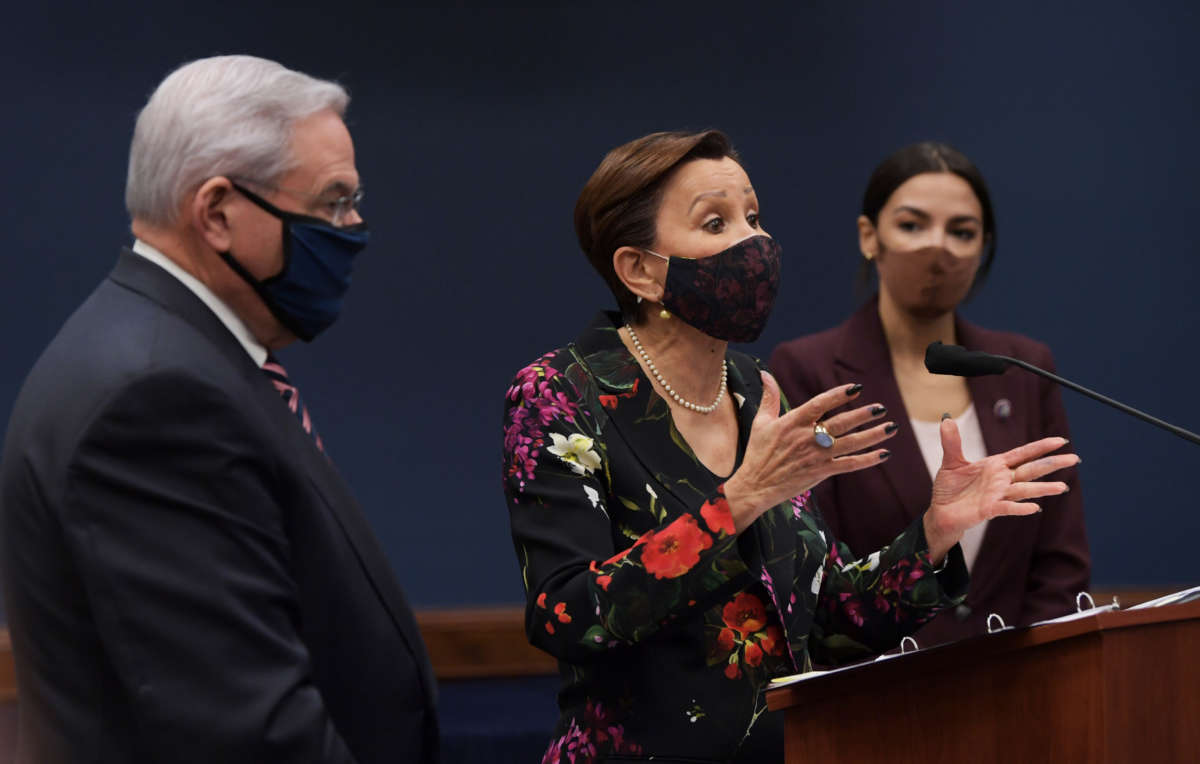Truthout is a vital news source and a living history of political struggle. If you think our work is valuable, support us with a donation of any size.
Democratic lawmakers in Congress introduced legislation on Thursday that would allow residents of Puerto Rico to determine their future political status.
The bill, introduced in the House by Representatives Alexandria Ocasio-Cortez (D-New York) and Nydia Velázquez (D-New York), and in the Senate by Sen. Bob Menendez (D-New Jersey), would call for the creation of a “status convention,” composed of delegates from Puerto Rico chosen by voters there. The delegation would come up with long-term ideas for what the island’s status could be — statehood, independence or another type of arrangement to replace its current territorial status.
The legislation, titled the Puerto Rico Self-Determination Act of 2021, is similar to a bill that was introduced by Velázquez and Ocasio-Cortez last year.
According to Menendez, the measure would also create a “bilateral negotiating commission” with other members of Congress and federal officials. It could also result in putting the options “before the people of Puerto Rico to vote in a federally recognized referendum for the first time,” he added.
Ocasio-Cortez emphasized the importance of allowing the people of Puerto Rico to determine their own fate. She added that the bill is key to building real democracy in the U.S.
“If we want to consider ourselves a democracy and live up to our values, it is fundamentally incompatible for an open democracy to have subjects,” Ocasio-Cortez said.
Earlier this month, after other Democratic lawmakers introduced legislation to incorporate Puerto Rico as a state, Ocasio-Cortez voiced strong opposition to the idea, noting that doing so would go against the ideals of self-determination for the people of the island territory.
“The question of Puerto Rico’s political status is long overdue, & the people deserve an inclusive & fair process to chart their own future,” Ocasio-Cortez tweeted on Thursday.
Velázquez concurred in her own tweet. “After over one hundred years of colonial rule, Puerto Ricans would have a mechanism to determine their own future” if the bill became law, she said.
While Puerto Rico held a nonbinding referendum last year on the idea of statehood, critics have maintained that the vote had many flaws. José López, the executive director of the Puerto Rican Cultural Center in Chicago, disagreed with the notion that the referendum last fall should be seen as an endorsement of statehood, in an interview with Margaret Power for Truthout earlier this year.
“It was a nonbinding referendum that had no real merit and a single yes or no question, ‘Should Puerto Rico be immediately admitted into the Union as a state?’ That was the only option offered to voters,” López said, noting that independence was not a choice given in the election.
López also stated that the referendum vote saw the lowest turnout in the island’s history. “Thousands turned in a blank vote on the referendum, or didn’t vote in the referendum at all, possibly because they did not recognize it as legitimate,” he added. “Taking all these factors into consideration, we can say statehood did not win.”
A terrifying moment. We appeal for your support.
In the last weeks, we have witnessed an authoritarian assault on communities in Minnesota and across the nation.
The need for truthful, grassroots reporting is urgent at this cataclysmic historical moment. Yet, Trump-aligned billionaires and other allies have taken over many legacy media outlets — the culmination of a decades-long campaign to place control of the narrative into the hands of the political right.
We refuse to let Trump’s blatant propaganda machine go unchecked. Untethered to corporate ownership or advertisers, Truthout remains fearless in our reporting and our determination to use journalism as a tool for justice.
But we need your help just to fund our basic expenses. Over 80 percent of Truthout’s funding comes from small individual donations from our community of readers, and over a third of our total budget is supported by recurring monthly donors.
Truthout has launched a fundraiser to add 340 new monthly donors in the next 5 days. Whether you can make a small monthly donation or a larger one-time gift, Truthout only works with your support.
